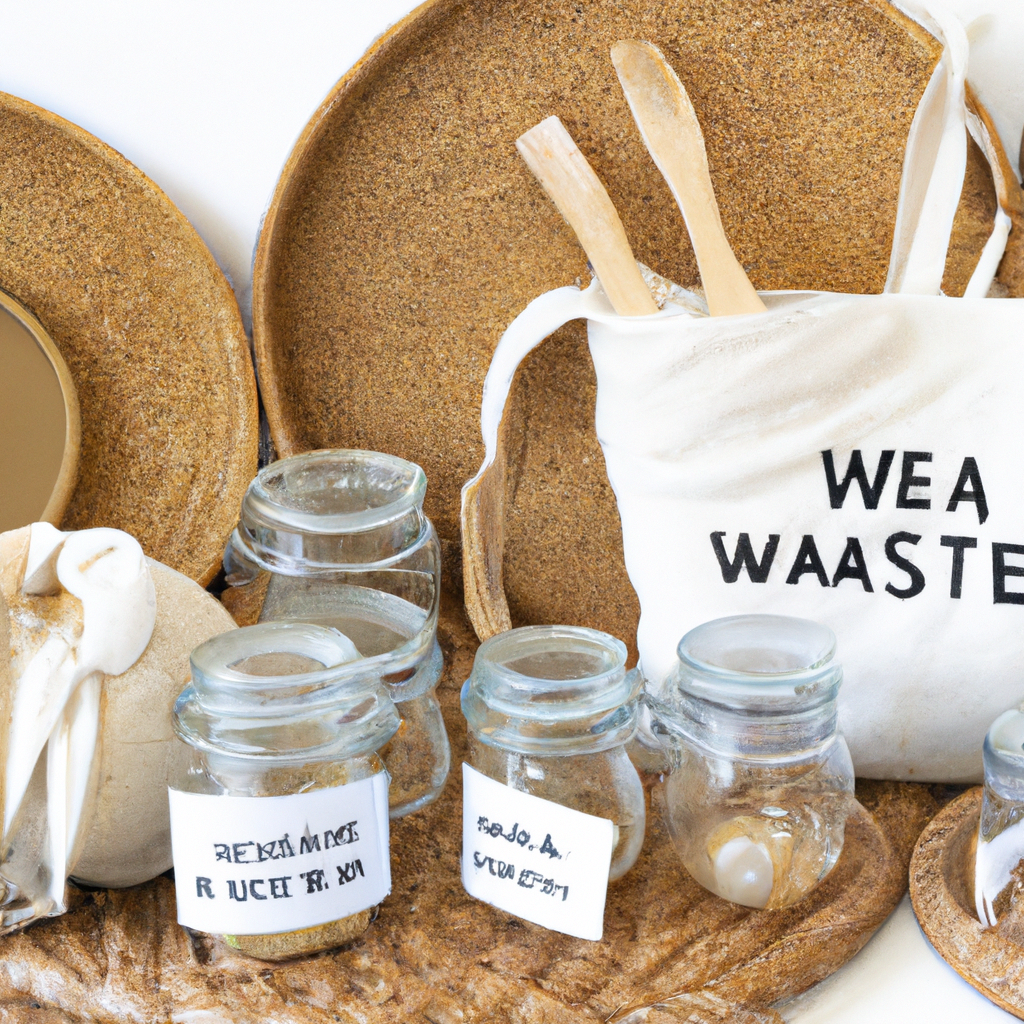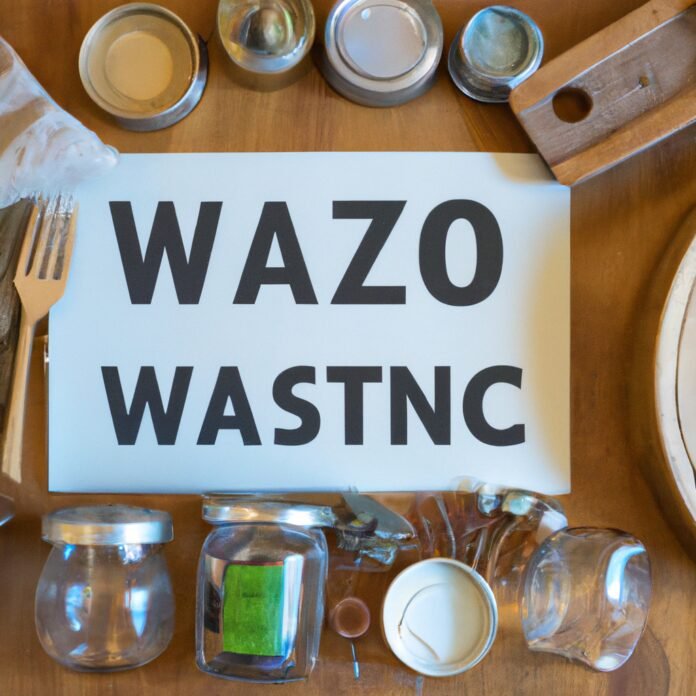Living a zero waste lifestyle is quickly gaining popularity amongst households across the nation. By simply making small adjustments to the everyday routines, big changes are made to reduce the amount of waste produced by households. This article will provide insight into ‘Zero Waste Living: Minimizing Household Waste’, showing how households can reduce and even eliminate their own trash output.
1. “Unlocking the Magic of Zero Waste Living: Crafting a Sustainable Future”
Living with zero waste is an important step towards crafting a more sustainable and joyful future. It involves minimizing the consumption of resources and reducing the amount of single-use items and materials that find their way into landfills. In doing so, we can reduce the impact of our lifestyles on the environment, and improve our own wellbeing in the process.
Use Reusable Items. Start by reducing the amount of plastic and disposable materials that make their way into your everyday life. This could be anything from using reusable cups, plates, and bags, to investing in reusable containers and filling them up from bulk stores. Every single item that you make the effort to reuse instead of throwing away counts.
Buy Less and Opt for Secondhand. When it comes to consuming new products, emphasize quality over quantity and prioritize buying secondhand items when appropriate. You can find everything from books to fashion items and furniture from secondhand sources in your area. You can also save money in the process and support local businesses.
Compost and Garden. Food waste often makes up for a significant part of household waste, along with paper and cardboard. Consider composting food scraps to create a nutrient-rich soil for your home garden. You can also look up composting initiatives in your area to make sure that food waste is diverted away from landfill.
DIY and Upcycle. Look for ways to make your home more sustainable through DIY projects and creative upcycling. Look for ideas for repairing items, reusing materials, and turning empty containers into useful objects. DIY projects don’t require a lot of resources and often save money in the long-run.
Opt for Sustainable Alternatives. Going zero waste can be difficult at first, but the more you get used to it, the simpler it becomes. Making sustainable lifestyle choices is worth the effort as it helps create a better future for everyone.
2. “From Trash to Treasure: Revolutionizing Household Waste Management”
Optimizing Our Waste Output
Ensuring our waste does not outpace our useful resources is the need of the hour. With the world’s barrels of trash reaching an all-time high, it’s important to adopt efficient waste management practices. Since household waste is one of the primary contributors to the global problem, it is only fair that we, as citizens, spearhead the revolution by doing our bit to solve it.
One of the best ways to go about it is to reduce our trash output in the first place. Making small conscious decisions to de-clutter and opt for sustainable lifestyle choices will reap great benefits in the long run. For example, an easy way to Chelsea this goal would be to start using reusable containers for food items, reusable paper towels instead of paper ones, and opting for products with less packaging.
Upcycling And Finding Creative Use Cases
Apart from reducing waste, another great way of utilizing what we no longer need is to repurpose and upcycle our existing waste. With some creativity and a little effort, we can actually seek useful prospects from discards. Some helpful ways to upcycle items include:
- Repurposing empty jars or bottles into organizers or decor accessories
- Creating bird-feeders using household items
- Donating or reselling items if still in usable condition
- Use cardboard boxes, egg trays, and other materials to create lovely decorations
Upcycling is a simple and effective way of ensuring waste is repurposed in a meaningful way. It is also great for the environment because it ultimately reduces the need to produce new materials.
Understanding The Waste Management System
At this point, it is important to acknowledge that waste management initiatives are not limited to our homes, but are inspired solutions at the city and municipal levels as well. All households should be aware of the waste management system as it applies to the locale, usually involving segregation into general waste, recyclable commodities, and special waste streams. Knowing and following the guidelines of proper garbage disposal can help fight the war on waste.
3. “Zero Waste: A Journey Towards a Greener Home and Planet”
Going green and actively seeking a path towards sustainability has become a key concern in many households. Zero waste is a movement that attempts to reduce waste output to eventually reach zero waste production. A zero waste lifestyle is not just about recycling household rubbish; it requires a complete rethink of the way we consume, store, and dispose of goods. Here are a few steps in the journey towards a zero waste home and planet.
- Reduce: The most crucial step on the journey to zero waste is the actual concept of reducing. The ability to buy and consume less is a fundamental part of this journey. Seek to consume responsibly, investing much time in researching and investing in products with minimum packaging, more sustainable options, and no single-use products.
- Reuse: Another important step is the idea of reusing. Several items that we buy can be used again and again. Investing in containers for items such as food, shampoo, or cleaners can be a great way to reduce packaging. Furthermore, using common items like towels and sheets for more than one purpose is also an excellent way of reusing.
- Repurpose: Repurposing things decreases the overall amount of waste leaving the home and it is often much more cost effective. Transforming old clothing and furniture into something new is both fun and rewarding. Items around the house can often be used as planters or for storage. Furthermore, furniture items like chopped up pallets and crates make great shelves and decorations.
- Recycle: Recycling household items and materials are a great way to contribute to the zero waste lifestyle. Join up to a local recycling centre and make sure to recycle frequently. It is also important to remember that not all products can be recycled, and it is often best to look for alternatives to reduce the amount of items to be recycled.
- Compost: The final step in the journey towards zero waste is composting. Composting is an excellent way to reduce organic waste from all organic food items. The compost created can be used in gardens and flower beds to add essential nutrients. Composting is also a great way to reduce methane emissions from landfills that are created without oxygen.
Adopting zero waste practices is a journey towards sustainability and can be made a reality with the help of small steps. Gradual changes to the home, such as rethinking the way we consume, store, and dispose of goods can allow for a much happier and healthier planet.
These steps are a starter to working towards zero waste, however, by actively researching into new methods that can help make things much easier, this journey can be further enriched. Each small and deliberate step made towards this stance will come together to create a greener home and planet.
4. “Beyond Recycling: Embracing Zero Waste Lifestyle for a Sustainable Tomorrow
In today’s world, recycling has long been seen as the primary way to reduce its impact on the environment. But with rising land and ocean pollution rates continue to rise, it’s now time to explore radical solutions that go beyond recyclables.
One such approach is zero waste lifestyle, where the purpose is to reduce the quantity of trash generated to as close to zero as possible. This goes beyond traditional recycling and focuses on preventative measures like optimizing the use of the products purchased and reducing packaging. Though this lifestyle takes greater effort and lifestyle adjustments, it promises more sustainable solutions and higher environmental impact.
Here are some of the key ways to pursue a zero waste life:
- Reusing and upcycling materials: One of the simplest solutions for a zero-waste lifestyle is to keep items, like glass jars or clothing, with multiple uses and to pass them on to others when they are no longer needed.
- Composting: Start your own composting system. By composting at home, you can reduce kitchen waste while also helping your garden with soil enriching nutrients.
- Eliminating single-use products: Refuse single-use items such as disposable plastic bags or take-out containers that are often used for convenience but ultimately end up in landfills.
- Reducing paper usage: Move away from paper-heavy habits and operations. Invest in digital platforms, eliminate paper bills, and opt for digital assets over tangible goods.
In doing so, you have the potential to make a huge difference in the amount of trash generated—all while still getting the most out of your life. This lifestyle can not only help the environment, but can also teach the importance of making sustainable decisions and lead the way for everyone else to do the same. From making small adjustments, to completely re-thinking our habits, it’s time to look beyond the traditional solution of recycling and embrace a zero waste lifestyle.
From small changes like bringing reusable containers and bags when shopping to larger life adjustments like composting food scraps, zero waste living can provide a sense of both personal accomplishment and environmental stewardship. By taking the time to think about what’s your waste and what’s not, you’re making the world a greener, better place—one plastic-free life-change at a time.



